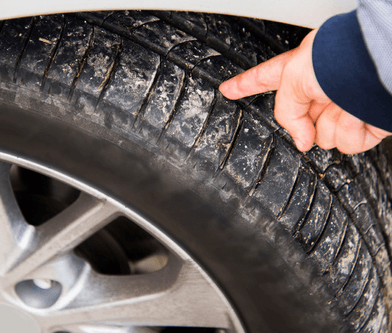A Guide to Tire Treadwear and Traction Grading
Auto Shops Located in: Chapel Hill, Durham, Taleigh, Apex, and Cary North Carolina

According to the National Highway Traffic Safety Administration, 622 motor vehicle traffic fatalities were caused by tire-related crashes in 2021. As the saying goes, your tires are the only thing between you and the road. As a result, it’s essential that you understand how to buy the correct tires for your vehicle and maintain them throughout the seasons.
In this article, we’ll dive into tire tread and traction grading so you can play your part in keeping everyone on the road safe, including yourself.
What Is a Treadwear Grade?
Like most grades, you want to obtain the highest number in order to pass the test. The test you’re trying to pass is all about road and vehicle safety. A treadwear grade is used to indicate the tire’s wear rate. The higher the number, the more time it will take to wear down the tread.
The treadwear ratings (along with the other grades) can be found on the sidewall of each passenger vehicle sold in the country. A grade of 100 is assigned to a control tire, and then the control is used as a comparison for other tires. For instance, if a treadwear grade is 300, it will take three times as long to wear down compared to the control tire.
What Is a Traction Grade?
What’s the distance your vehicle will travel on a wet road before it comes to a complete stop? The answer to this question can be found by looking at your tire’s traction grade. The grading scale is “AA”, “A”, “B”, and “C,” with higher grades indicating the tire can stop faster on wet pavement. “AA” is the highest ranking, and currently, only 15% of tires have this rating. Typically, you’ll want to avoid tires with ratings of C or B, as this rating means they’ll take longer to stop on wet pavement.
What Is a Temperature Grade?
Alongside tire tread and traction grading, you can determine the quality of a tire by checking its temperature grade. This grade measures the tire’s resistance to heat, which is a concern when driving long distances, especially during the summer.
The grading system, from highest to lowest, uses “A”, “B”, and “C” grades to measure this aspect of tire quality. Currently, 34% of tires have a “B” rating, while 4% have received a “C”. Generally, “A” rated tires will be the right choice for most drivers, as they offer the highest level of protection from sustained high temperatures that can cause your tires to deteriorate.
What to Consider When Buying New Tires
When your old tires need to be replaced and you need to buy new ones, it’s a good idea to be armed with the above information. Most drivers will want to go with tires that have “A” ratings for traction, treadwear, and temperature, as they all provide significant protection from wear and environmental factors.
As you look for a new set of tires, be sure to refer to the vehicle’s owner’s manual when it comes to tire size. The information is also posted inside the driver’s side door, and you should review it to ensure you’re purchasing tires in the right size for your vehicle.
Besides checking their grades and size, you’ll also want to make sure you’re purchasing the right type of tire. Before you make a purchase, check if the tires are all-season, winter, summer, or all-terrain. Basically, you’ll want to base your tire type on the weather you typically drive in. For example, if you live in an area where snow, extreme temperatures, and mud aren’t a major concern, all-season tires are a great choice.
However, if you often find yourself driving in deep snow, winter tires are a better option. In warm weather, summer tires will withstand high temperatures but aren’t designed for snow, ice, or freezing temperatures, making them a good choice for those who live in climates that are hot year-round. When you love taking your vehicle off-road, you’ll need all-terrain tires to navigate between different landscapes.
Tire Maintenance
Alongside checking your tires’ grades and types before you buy, you’ll want to properly maintain them to keep them performing at their best for as long as possible. Review some of our top tips for tire maintenance below:
- Keep your tires inflated at the right levels: Proper tire inflation is crucial to your car’s performance and safety. If you’re looking to save money on gas, this is one way to do so.
- Receive regular tire rotation services: Tire rotation is also important because it ensures the treads are evenly worn, making your ride much smoother. Keeping them balanced and aligned is also recommended to extend their longevity.
- Review your tire treads monthly: Check the treads once a month using the penny trick or the built-in treadwear indicators. If using a penny, place it between the treads, and if Lincoln’s head disappears, you’re in good shape.
- Check treadwear indicators: Treadwear indicators are raised sections between the treads. Replace tires when they are level with the indicator.
Choose Chapel Hill Tire for Tire Replacement Services in the Triangle
If you’re looking for new tires near you in Raleigh, Durham, Chapel Hill, or the surrounding areas, turn to Chapel Hill Tire. At Chapel Hill Tire, we offer free lifetime and flat repairs on tires purchased from us. Pressure checks are free, and you’ll receive an annual risk-free alignment evaluation. We even have a handy tire shopping tool on our website so you can find the right tire for your vehicle.
Remember, tires are the only thing separating you and the road, so this is one area where being cheap can put you at risk of having an accident. Take advantage of our price-beat guarantee and schedule an appointment for a tire replacement service.















